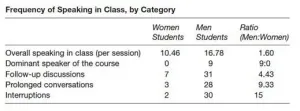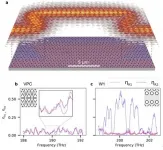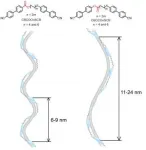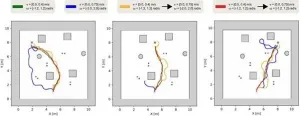College classrooms are still chilly for women, as men speak more
Gendered participation has a long way to go to reach equity
2021-01-19
(Press-News.org) Men speak 1.6 times more often than women in college classrooms, revealing how gender inequities regarding classroom participation still exist, according to a Dartmouth study. By comparison, women are more hesitant to speak and are more apt to use apologetic language. The findings are published in Gender & Society.
When students didn't have to raise their hands to participate in class, men spoke three times more often than women. "You would think that it would be more equitable for students to not have to raise their hands to speak in class because then anyone could talk but our results showed otherwise. The higher level of participation relates to the idea of who may have felt like they were entitled to speak or had permission to do so," explains Janice McCabe, an associate professor of sociology at Dartmouth College. "Once you take away the structure of a professor calling on students, you see more of the cultural expectations that people may have, and the gender hierarchies present in the college classroom today."
For the study, McCabe and Jennifer J. Lee '17, a sociology major at Dartmouth, whose senior thesis focused on this work, sought out to find out if a "chilly climate" still exists in college classrooms. They wanted to see if things had changed, following research in the 1990s on the topic by Myra Sadker and David Sadker. The term, "chilly climate," was first coined by Robert M. Hall and Bernice R. Sanders in 1982, as part of their research on gender dynamics in the classroom.
Through 80 class sessions, Lee observed 95 hours of classes in nine courses in the humanities, social sciences and natural sciences. The class sizes ranged between 10 and 40 students. The gender ratio in the classes varied and five of the nine classes had a larger percentage of female students. Five of the nine classes were taught by women. The students' and professors' exact words and body language was observed, so that both the frequency and the context of engagement was documented. The researchers analyzed the data using a software that codes the behavior, which helped them identify patterns across the results.
In all nine courses, men spoke out without raising their hands more than women. Men used more assertive language and were more likely to interrupt others regardless of the gender make-up of the class or gender of the professor. Men also participated in more follow-up discussions (31 vs. 7) and prolonged conversation (28 vs. 3) with professors than women.
When professors took proactive measures to engage all students, such as by having clear parameters for participation or by deliberately calling on female students who had not had a chance to speak, this created an environment for a more equitable discussion.
In U.S. colleges, women outnumber men. McCabe adds that "Our results demonstrate that women's voices still may not be heard, and that gender hierarchies continue to persist. Once students and professors are cognizant of these gender dynamics in the classroom, it is easier to change them."
INFORMATION:
McCabe is available for comment at: janice.m.mccabe@dartmouth.edu. Study co-author Jennifer J. Lee is now in a Ph.D. program in the department of sociology at Indiana University.
[Attachments] See images for this press release:

ELSE PRESS RELEASES FROM THIS DATE:
2021-01-19
RICHLAND, Wash.--E-cigarettes stress and inflame the lungs of rats, compromising important regulatory proteins through exposure, according to research recently published in the journal Redox Biology. The findings, made possible by a biomolecular technique developed by researchers at the U.S. Department of Energy's Pacific Northwest National Laboratory, reveal that vaping induces subtle structural changes in proteins, marking the first time researchers have measured such damage. The results suggest that common compounds in the electronic alternative to conventional cigarettes are not without their own harms.
After exposing rats to e-cigarette vapor for three one-hour sessions ...
2021-01-19
Some say future wars will be fought over water, and a billion people around the world are already struggling to find enough water to live.
Now, researchers at the National University of Singapore (NUS) are coming to the rescue. They have created a substance that extracts water from air without any external power source.
In the earth's atmosphere, there is water that can fill almost half a trillion Olympic swimming pools. But it has long been overlooked as a source for potable water.
To extract water from this under utilised source, a team led by Professor Ho Ghim Wei from the NUS Department of Electrical and Computer Engineering created a type of aerogel, a solid material that weighs almost nothing. Under the microscope, it looks like a sponge, but it ...
2021-01-19
University of South Australia scientists have developed the world's first test to accurately predict mood disorders in people, based on the levels of a specific protein found in the brain.
Links between low levels of mature brain-derived neurotrophic factor (mBDNF) and depression are well known but, until now, it hasn't been possible to distinguish between the three forms of the BDNF protein in blood samples.
The mature form promotes the growth of neurons and protects the brain, but the other two BDNF forms - its precursor and the prodomain of BDNF - bind to different receptors, causing nerve degeneration ...
2021-01-19
SINGAPORE, 19 January 2021 - Duke-NUS Medical School researchers, together with collaborators in Singapore, have designed armoured immune cells that can attack recurring cancer in liver transplant patients, while temporarily evading immunosuppressant drugs patients take to avoid organ rejection. The findings were published in the journal Hepatology.
Hepatocellular carcinoma is the most common type of primary liver cancer and the sixth most common cancer worldwide. It often develops in people with chronic liver disease following hepatitis B infection.
A common treatment for hepatocellular carcinoma is to completely ...
2021-01-19
Topologically tailored photonic crystals (PhC) have opened up the possibility for attaining robust unidirectional transport of classical and quantum systems. The demand for unprecedented guiding capabilities that support unhindered transport around imperfections and sharp corners at telecom wavelengths, without the need for any optimization, is fundamental for efficient distribution of information through dense on-chip photonic networks. However, transport properties of experimental realizations of such topologically non-trivial states have been inferred by transmission measurements and even though robustness ...
2021-01-19
Overview:
A team of researchers led by Assistant Professor Yuki Arakawa (Toyohashi University of Technology, Japan) has successfully developed sulfur-containing liquid crystal (LC) dimer molecules1) with oppositely directed ester bonds, which exhibit a helical liquid crystal phase, viz. twist-bend nematic (NTB) phase, 2) over a wide temperature range, including room temperature. Collaboration with a team at the Advanced Light Source research facility (Lawrence Berkeley National Laboratory, USA) revealed that the ester bond direction in the molecular structures largely impacts the pitch lengths of helical nanostructures in the NTB phase. It is expected that this molecular design ...
2021-01-19
Overview:
A research group from the Active Intelligent System Laboratory (AISL) at Toyohashi University of Technology (TUT) has proposed a new framework for training mobile robots to quickly navigate while maintaining low collision rates. The framework combines deep reinforcement learning (DRL) and curriculum learning in the training process for robots to learn a fast but safe navigation policy.
Details:
One of the basic requirements of autonomous mobile robots is their navigation capability. The robot must be able to navigate from its current position to the specified target position ...
2021-01-19
CHAMPAIGN, Ill. -- The fossilized insect is tiny and its genital capsule, called a pygophore, is roughly the length of a grain of rice. It is remarkable, scientists say, because the bug's physical characteristics - from the bold banding pattern on its legs to the internal features of its genitalia - are clearly visible and well-preserved. Recovered from the Green River Formation in present-day Colorado, the fossil represents a new genus and species of predatory insects known as assassin bugs.
The find is reported in the journal Papers in Palaeontology.
Discovered in 2006 by breaking open ...
2021-01-19
Simple vision tests can predict which people with Parkinson's disease will develop cognitive impairment and possible dementia 18 months later, according to a new study by UCL researchers.
The study, published in Movement Disorders, adds to evidence that vision changes precede the cognitive decline that occurs in many, but not all, people with Parkinson's.
In another new study published today in Communications Biology, the same research team found that structural and functional connections of brain regions become decoupled throughout the entire brain in people with Parkinson's disease, particularly among people with vision problems.
The ...
2021-01-19
There are high hopes for the next generation of high energy-density lithium metal batteries, but before they can be used in our vehicles, there are crucial problems to solve. An international research team led by Chalmers University of Technology, Sweden, has now developed concrete guidelines for how the batteries should be charged and operated, maximising efficiency while minimising the risk of short circuits.
Lithium metal batteries are one of several promising concepts that could eventually replace the lithium-ion batteries which are currently widely used - particularly in various types of electric vehicles.
The big advantage of this new battery type is that the energy density can be significantly ...
LAST 30 PRESS RELEASES:
[Press-News.org] College classrooms are still chilly for women, as men speak more
Gendered participation has a long way to go to reach equity







